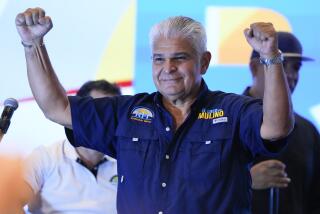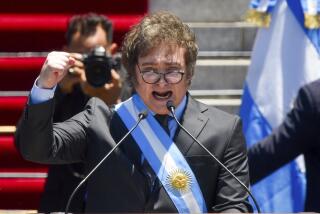Argentine Economy Minister Dies; New Reform Plan in Jeopardy
- Share via
BUENOS AIRES — Economy Minister Miguel Roig, architect and symbol of Argentina’s bold economic recovery plan, died Friday of a heart attack, throwing the new Peronist government into turmoil just a week into its term.
Roig, who came into public service after a career as one of the nation’s most powerful business executives, was stricken in his car while being driven back to his office from a luncheon reception at the French Embassy on Bastille Day.
The death of the 67-year-old civil engineer was a disastrous blow to President Carlos Saul Menem’s effort to curtail hyper-inflation and restructure the decayed economy. Roig, who acknowledged that he did not even vote for Menem, was an important symbol of the president’s attempt to draw in leaders from a range of sectors, including the traditionally anti-Peronist business community, and of Argentina’s resolve to take part fully in the international economic arena.
Roig was apparently on the verge of reaching an accord with business leaders on a price freeze that would allow some breathing space to implement longer-term measures attacking decades-old inefficiency and mismanagement.
Reform Legislation
Shortly after he died, Congress received the government’s omnibus economic reform bill calling for the sale to the private sector of 17 major government-owned firms, including the national telephone company.
The soft-spoken, slight Roig recently retired as executive vice president of Bunge & Born, an Argentine-based multinational holding company that is one of the world’s largest grain firms. Roig brought in several other Bunge & Born executives as his assistants.
Menem convened an emergency Cabinet meeting at the Casa Rosada, the presidential palace. Roig’s body was to lie in state in the palace.
The nation’s currency, the austral, declined from 710 to 790 per dollar in unofficial trading on the black market as news of Roig’s death reached the exchange houses at the close of trading.
Financial journalists, speculating privately, mentioned as possible successors Orlando Ferreres, secretary of economic coordination and a former director of a Bunge & Born chemical company; Foreign Minister Domingo Cavallo, an economist and veteran Peronist politician; and Central Bank President Javier Gonzalez Fraga.
Roig’s early measures drew overwhelming approval from Argentines, who are desperately trying to survive hyper-inflation that reached 114% for June alone and appears likely to approach 200% this month--more than four times the previous record before the current crisis. From shopkeepers to chambers of commerce and industry, the program met with applause for its determination to end privileges and demand sacrifice from all sectors in return for future economic health.
Menem swore in Roig and the rest of his Cabinet last Saturday, after himself taking the oath to succeed President Raul Alfonsin, who quit five months early because of the economic crisis.
The new economy minister made his public debut Sunday night, announcing to the nation in a television address the outlines of his plan, including the selling off of deficit-ridden state-owned businesses, a simplified but enforced tax system and an end to subsidies to private companies.
Interest rates fell this week from more than 100% a month to as low as 6% monthly after Roig’s 53.7% devaluation of the austral to an official rate of 650 per dollar. He had insisted that a stable, realistic currency is a key to restoring credibility to the system.
Financial analysts had agreed that speed and decisiveness were vital to defeat the hyper-inflation and give the long-term programs a chance to succeed. Roig’s death is certain to disrupt the rapid pace adopted during the first week of Menem’s six-year term.
After describing the horrific toll of layoffs, lost production and consumer hardships caused by the crisis, Roig declared: “This diagnosis, so severe, should not make us think there is no solution. We know that we will require new sacrifices from the people, but this time for the sake of the structural changes that will be the genuine base for the recovery of our country.”
Roig spent Friday morning attempting to reach a final accord with major companies on a temporary price freeze, after a week of heavy increases despite the government’s order that prices be held at July 3 levels. Officials of his ministry had said that the accord was likely to be signed by the end of the day. His death left the discussions unresolved, probably until next week.
More to Read
Sign up for Essential California
The most important California stories and recommendations in your inbox every morning.
You may occasionally receive promotional content from the Los Angeles Times.













